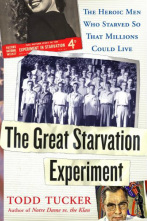
Tucker shares the tools subject number 20 used to sustain his mental strength and what extremes he went through to try and get out of the experiment. During the beginning of the experiment he chopped wood logs in half and repeated over and over, “I can do this”, “I can do this”! He chopped wood during the times everyone else was eating so that he would not have to endure the smells of food or see the food. Tucker shares that 3 months to the end of the experiment subject 20 started trying to hurt his self in an effort to get kicked out of the experiment due to injury. I commend him for going nine years. One of the tirades he tried was dropping his car on his hand but the injury did not prove bad enough to go home.
Tucker provides tons of contexts for the experiment, describing other medical experiments, including those conducted by Joseph Mengele in Auschwitz and by the Japanese on prisoners of war. The Japanese experiments have gotten less attention than German ones due to the fact that the U.S. agreed to give the Japanese immunity from prosecution in exchange for the knowledge they gained. I find that unexcitable! The thing that sets this experiment apart from others is that the men chose to participate and were informed of all the dangers. These men, where chosen from over 200 applicants and were deeply committed to the cause of peace and service to humanity. They did not believe that they could in good conscience go to war, but they wanted to do something to show their support.
The mental effects of starvation proved to be very interesting because it turns out that we will eat anything and do anything to survive when we are hungry. It is a scary thought. This book is very interesting and shocking at the same time. It was a quick read. I think that history teachers could do a book talk in their class to make the students aware of the challenges in reference to starvation that were faced in World War II. A book talk would be the best way because this book brings up a lot of questions and debate regarding the ethics of the experiment.
Tucker, T. (2006). The great starvation experiment: the heroic men who starved so that millions could live. New York: Free Press

References
http://authors.simonandschuster.com/Todd-Tucker/27849582
 RSS Feed
RSS Feed